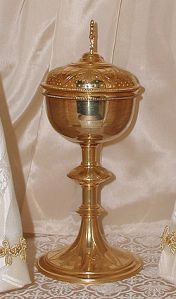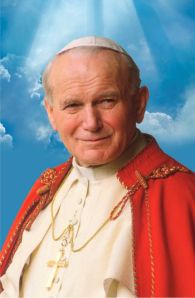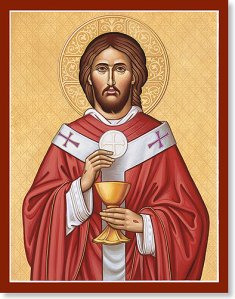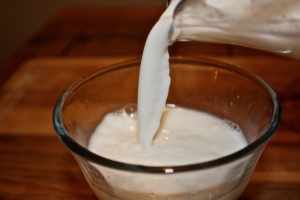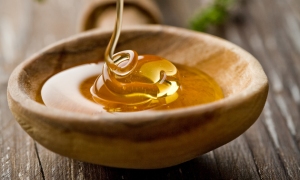The glistening tabernacle silently greeted me, sending forth an arch of gold, yellow and bronze light. I sat down and opened my book of hours. Nothing could be heard, no birdsong outside nor distant lawnmowers roaring,-not even the shuffle of feet as others entered the church. Periodically I glanced up at the abode of my Lord, perhaps nervously but more likely, full of thoughts. Sally, one of our sacristans, approached. Her neatly cropped hair and white shirt shone like silver beneath the bluish stained-glass window. Seeing me paused, with the open book, she said:
“Sing.”
And so I began chanting as she slowly opened the tabernacle, retrieved a golden container of already consecrated hosts. Beside it, was placed a small silver monstrance holding a larger, exposed host. She knelt down in reverence before closing the tabernacle and bringing the container to the sacristy. Immediately, I realized that a priest wasn’t available to say Mass today, that we would be holding a communion service led by the deacon instead. Anxiety gripped my heart as I thought of our parish priest and the sickness in his family that kept him away at this time. Ringing out the psalms, I asked God to watch over him. A thought suddenly came to mind. I stopped chanting and turned to Sally who now sat behind me. My heart thudded. The odd request lingered on my lips. Nervously, I asked:
“If it is allowed, can you open the tabernacle so that we can adore the host?”
~ ~ ~
“We can do that as long as I’m here,” Sally answered.
I didn’t check the expression on her face, whether it was joyful, eager- or baffled but gladly knelt down when the heavy metal doors were opened again, revealing the silent little host in its silver casing. Feelings of littleness and aggravation at my sins hit me full force. I really was no one and nothing compared to Our Almighty God who deigned to descend from heaven and dwell with us. I finished my prayers and remained kneeling on the floor for several minutes as love gently emanated from the small host, washing over everything like the sunlight, making cold places grow warm again. And at that moment, love was enough. He was enough.
Shuffling emerged behind us and glancing over my shoulder, I saw a man with sparse hair, glasses over his bright eyes and a white collar. Slung over his arm was a long, white garment. A priest! Rather flustered, he asked about the time of the Mass, explaining he got lost on the way to the church. Sally instantly sprang up to help him and followed him down the aisle. Hurriedly, not considering propriety, I closed the tabernacle, dropped upon one knee and said farewell to my Jesus, knowing I would see him again in just a few moments. My mind leaped and ran in circles as I absentmindedly followed them into the sacristy.
“Is there anything I can do?” I blurted out.
The priest was already throwing on vestments and I eyed the floor, worried I’d interrupted him somehow. I always worried about this. However, relief flooded my heart as Sally answered,
“Yes, you can take these hosts, put them in the tabernacle, lock it and bring me the key.”
As she placed the round, golden container in my outstretched hands, I bowed down and closed my eyes like a samurai receiving his sword in some epic movie. I walked gingerly, like a chemist carrying concentrated acid. I shivered expectantly, like a young, virgin girl pregnant with the Savior of the world. The thing in my hands was infinitely more precious than gold, jewels, the finest spices, more weighty than the universe. Every instinct in me wanted to loudly start singing: “Pange lingua gloriosi.” I sang it in my heart instead.

